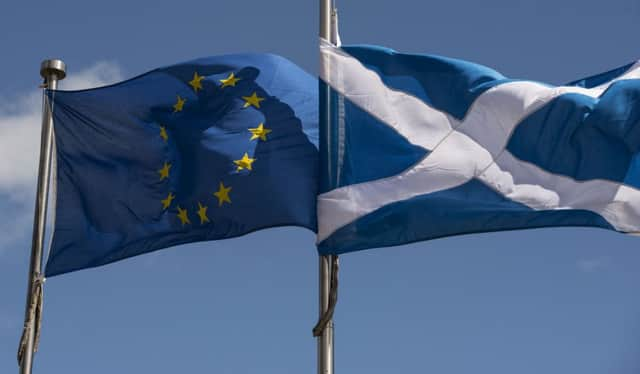Give Scotland more power or risk the future of the UK, peers warn


Brexit risks dissolving the “glue” that binds the economies of the United Kingdom, a House of Lords committee has warned in a report calling for devolved administrations to get a much bigger say on negotiations with the EU.
Powers and responsibilities returning from the EU after Brexit should automatically be devolved to Scotland and Scottish ministers should be given some powers over immigration, the report argues.
Advertisement
Hide AdAdvertisement
Hide AdHowever, peers also claim Brexit will render the Barnett Formula obsolete, with a new mechanism required to distribute funds to devolved nations based on need, potentially costing Scotland hundreds of millions of pounds.
The report was welcomed by the Scottish Government as a boost for its demands that Holyrood ministers be given a seat at the Brexit negotiating table in Brussels.
Scottish Labour also welcomed calls for a fundamental rethink of devolution after the UK leaves the EU.
Peers on the House of Lords EU Committee said existing talks between the UK and devolved governments were “not being treated with respect or organised efficiently” and called on the UK government to “raise its game”.
Their report says the Joint Ministerial Committee (European Negotiations), a sub-committee set up to allow ministers from the UK, Scotland, Wales and Northern Ireland to discuss the Brexit process, should have the authority to agree common positions on important issues for negotiations with the EU.
The call comes after Scottish Brexit Minister Mike Russell demanded the JMC meetings be urgently reconvened by the UK government.
A plenary session bringing together Nicola Sturgeon and Theresa May has not been held since February, with senior sources blaming the crisis in Northern Ireland for the hiatus.
In their report, peers say Brexit poses a “fundamental challenge” to the future of the UK and will lead to “an increased risk of clashes between the devolved administrations and the UK government” as they battle over powers returning from the EU over devolved areas such as agriculture, fishing and the environment.
Advertisement
Hide AdAdvertisement
Hide AdThe Scottish and Welsh Governments have threatened to trigger an “immense” constitutional crisis by withholding consent for the government’s repeal bill, a crucial piece of legislation that will transfer EU regulations into British law while ring-fencing returning powers to be devolved at a later date.
The report effectively calls on the UK government to reverse its position. “Brexit will be a major constitutional change for the United Kingdom, and thus potentially a source of instability.
“Any attempt to use Brexit to make a power-grab, either to ‘re-reserve’ powers previously devolved, or to claim more devolved powers, could compound such instability: this is not the time to embark on controversial amendments to the devolution settlements.”
However, because the current system of EU structural funds is based on economic need rather than population size, the report says Brexit presents the opportunity to “bite the bullet” and replace the Barnett Formula, as funds distributed under the current model for devolved governments would disadvantage Wales and Northern Ireland.
The Lords also stressed there is a “strong political and economic case” for Scotland to be able to strike its own Brexit deal with the EU.
However, they dismissed Scottish Government calls to remain in the European single market after the rest of the UK leaves the trading bloc as being “politically impracticable, legally highly complex and economically potentially disruptive to the functioning of the UK single market”.
The report made clear the “integrity and efficient operation of the UK single market must be an over-arching objective for the whole United Kingdom” during the Brexit process - but added “that objective does not preclude differentiated arrangements for Scotland in some areas, and nor does it justify excluding the Scottish Government from the Brexit process”.
With Scotland having relied on immigration to boost its population, the report said the UK government should use its forthcoming immigration bill “to look for opportunities to enhance the role of the devolved institutions in managing EU migration”, adding that “local and regional economic and demographic needs, rather than central targets, should drive decision-making”.
Advertisement
Hide AdAdvertisement
Hide AdMr Russell said: “This report makes clear Brexit should not be used as cover for a ‘power grab’, and that powers in areas such as fisheries, agriculture and environmental protection should be returning from Brussels to Edinburgh, Cardiff and Belfast – not Westminster.
“But just as there should be no power grab, there should be no attempt to use Brexit to cut Scotland’s budget.”
A UK government spokesman said: “We have been clear that the repeal bill will not take away any decision-making powers from the devolved administrations immediately after exit.
“Instead, to protect the UK internal market, some decision-making powers being transferred into UK law will be held temporarily to allow intensive discussion and consultation with the devolved administrations.”